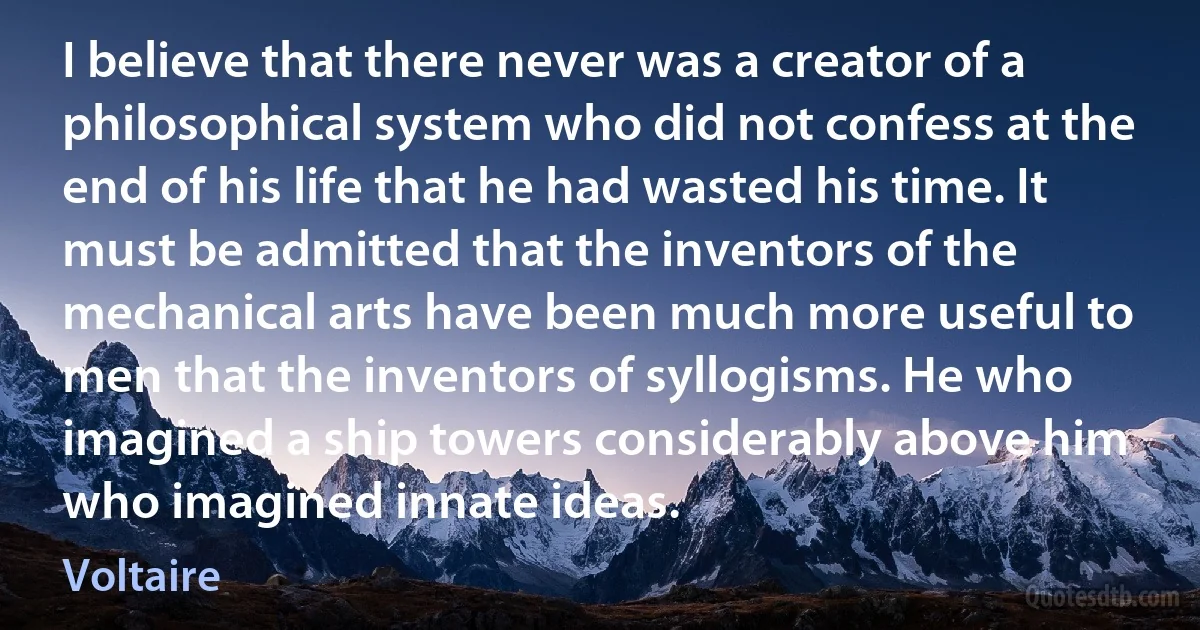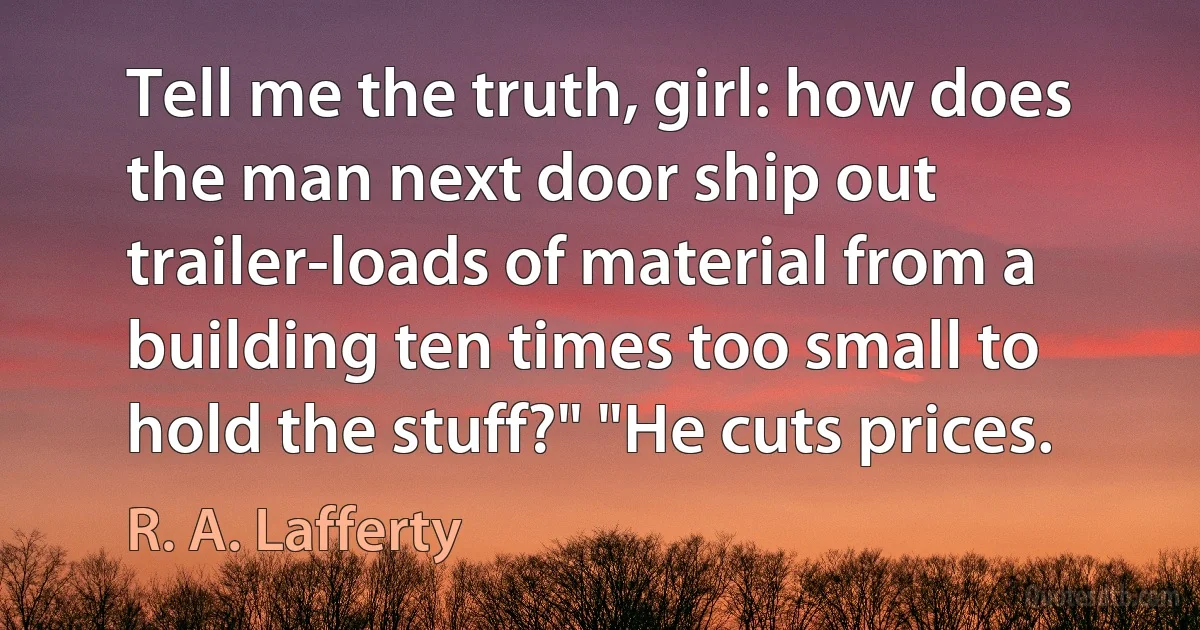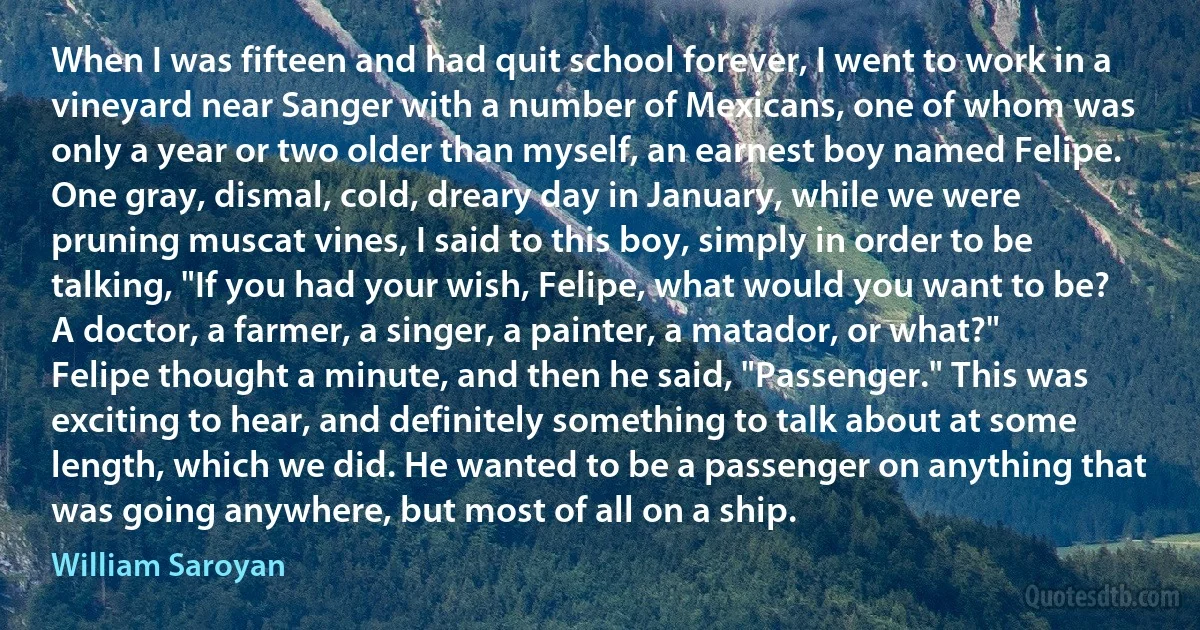Ship Quotes - page 24
It has been said that one bad general is better than two good ones, and the saying is true if taken to mean no more than that an army is better directed by a single mind, though inferior, than by two superior ones at variance and cross-purposes with each other. And the same is true in all joint operations wherein those engaged can have none but a common end in view and can differ only as to the choice of means. In a storm at sea no one on board can wish the ship to sink, and yet not unfrequently all go down together because too many will direct and no single mind can be allowed to control.

Abraham Lincoln
Honour the brave who sleep
Where the lost "Titanic” lies,
The men who knew what a man must do
When he looks Death in the eyes."Women and children first,”-
Ah, strong and tender cry!
The sons whom women had borne and nursed,
Remembered,-and dared to die.The boats crept off in the dark:
The great ship groaned: and then,-
O stars of the night, who saw that sight,
Bear witness, These were men!

Henry van Dyke
For we Englysshe men ben borne under the domynacyon of the mone, whiche is never stedfaste but ever waverynge, wexynge one season and waneth and dyscreaseth another season. And that comyn Englysshe that is spoken in one shyre varyeth from a-nother, in so moche that in my dayes happened that certayn marchauntes were in a ship in Tamyse for to have sayled over the see into Zelande, and, for lacke of wynde, thei taryed atte Forlond, and wente to lande for to refreshe them. And one of theym named Sheffelde, a mercer, cam in to an hows and axed for mete and specyally he axyd after eggys, and the goode wyf answerde that she could speke no Frenshe. And the marchaunt was angry, for he also coude speke no Frenshe, but wolde have hadde egges; and she understode hym not. And thenne at laste a-nother sayd that he wolde have eyren. Then the good wyf sayd that she understod hym wel. Loo, what sholde a man in thyse dayes now wryte, egges, or eyren?

William Caxton
So many people are waiting for their happiness to come. It's not here yet, but they are waiting. It's like standing in a line waiting for your bus. One day, people say, my ship will come. One day, I'll make it. One day, I'll be happy. Ships come and go, and they wait for theirs. They think about jumping on other people's ships. They think everything. Yet, incredibly enough, there has always been someone who has pointed out the simple fact that what we are looking for is inside.

Prem Rawat
If you see the fury and hear the howling of the tempest, or read of shipwrecks, think of the storm of human passions causing daily groans and disturbance in the hearts of men, wrecking the spiritual ship of the soul or the ship of human society; and pray fervently to the Lord that He may subdue the tempest of sins, as He once subdued the tempest at sea by His word, and that He may root our passions from our hearts, and re-establish in them unceasing tranquility.

John of Kronstadt
Tradition is important in the Government, but fortunately I had conspirators who were willing to help me shatter precedent. But among my male colleagues who had to sign the papers, the thought of one woman on a ship with some fifty men was unthinkable. After much soul searching, it was decided that maybe two women would be all right, so I arranged with a friend, who was also a writer, to go with me.

Rachel Carson
I find the audiences very excited. But then they come and say to me, "Your optimism has brushed off on me. I didn't know we had an option. I feel so much better." They say, "Your optimism." And I am not optimistic or pessimistic. I feel that optimism and pessimism are very unbalanced. I am a very hard engineer. I am a mechanic. I am a sailor. I am an air pilot. I don't tell people I can get you across the ocean with my ship unless I know what I'm talking about.

Buckminster Fuller
One time I was sitting in Sitka, Alaska-did you ever get a chance to go there? Beautiful. Like sometimes you just go someplace. I was at a writers' workshop. I was in Sitka, Alaska, and I was watching-you know, the eagles were capturing the salmon that had come in. And so there was like eagles diving down into the ocean, and, you know, the salmon. And there were bears. And I looked out there, and I saw this cruise ship coming into the left of my vision. And it came in, and I was like, "Oh, I don't like that.” The cruise ship came in, and then I watched that cruise ship turn a 180 and go exactly back out. And that's basically what we've got to do. You know, we have to make the next economy, and that next economy is going to be green. That next economy is going to have people like me making decisions. I'd like to be an architect for the next economy. I didn't like the last one.

Winona LaDuke
We have already transgressed the limit of safety, and the present disorders of our time are but precursors of other and imminent dangers. The rudder of our ship has ceased to move obedient to the helm. We are drifting on the seething tide of business, each one absorbed in holding his own in the giddy race of competition, each one engrossed in immediate cares and seldom disturbed by thoughts of larger concerns and ampler interests. Even our domestic life has lost much of its former warmth and geniality.

Felix Adler
The Chinese people have always cherished goodwill towards the American people. In 1784, U.S. merchant ship, Empress of China, sailed to China, opening the friendly exchanges between our two peoples. In mid 19th century, several dozen thousand Chinese workers, working side-by-side with American workers and braving harsh conditions, built the great railway linking the East and the West of the American continent.

Hu Jintao
I remember one evening on the Tamar [river in South-west England]; the sun had set, and the shadows become very deep. Demaria, looking at a seventy-four [ship] lying under Saltash in Cornwall, said, 'You were right, Mr. Turner; the ports cannot be seen. The ship is one dark mass'. 'I told you so', said Turner: 'now you see it all is one mass of shade'. 'Yes, I see that is the truth, and yet the ports are there'. [Turner:] 'We can take only what we see, no matter what is there. There are people in the ship: we don't see them through the planks'. 'True', replied Demaria. There had been a discussion on the subject before between the two professional men, in which Turner had rightly observed that after sunset, under the hills, the port-holes were undiscernible. We now had ocular proof of it.

J. M. W. Turner
There are something like 80 or 90 "airlines” - in quotes - registered in Congo, and these simply belong to tiny exploitative companies that harness boy soldiers and kids to dig out the diamonds or the coltan, whatever it may be, and ship it out of Congo without paying duty or anything of that sort. Without paying royalties to anyone is theft. And Congo is being exploited by everybody on account of these reasons, in addition to providing the battleground for other people's wars.

John le Carré
You won't find a new country, won't find another shore.
This city will always pursue you.
You'll walk the same streets, grow old
in the same neighbourhoods, turn grey in these same houses.
You'll always end up in this city. Don't hope for things elsewhere:
there's no ship for you, there's no road.
Now that you've wasted your life here, in this small corner,
you've destroyed it everywhere in the world.

Constantine P. Cavafy
A composer's awareness of the plurality of functions of his own tools forms the basis for his responsibility just as, in everyday life, every man's responsibility begins with the recognition of the multiplicity of human races, conditions, needs, and ideals. I would go as far as to say (as my anger comes back) that any attempt to codify musical reality into a kind of imitation grammar (I refer mainly to the efforts associated with the Twelve-Tone System) is a brand of fetishism which shares with Fascism and racism the tendency to reduce live processes to immobile, labeled objects, the tendency to deal with formalities rather than substance. Claude Lévi-Strauss describes (though to illustrate a different point) a captain at sea, his ship reduced to a frail raft without sails, who, by enforcing a meticulous protocol on his crew, is able to distract them from nostalgia for a safe harbor and from the desire for a destination.

Luciano Berio
Philosophers today are as fond as ever of apriori arguments with ethical conclusions. One reason such arguments are always unsatisfying is that they always prove too much; when a philosopher 'solves' an ethical problem for one, one feels as if one had asked for a subway token and been given a passenger ticket valid for the first interplanetary passenger-carrying space ship instead.

Hilary Putnam



